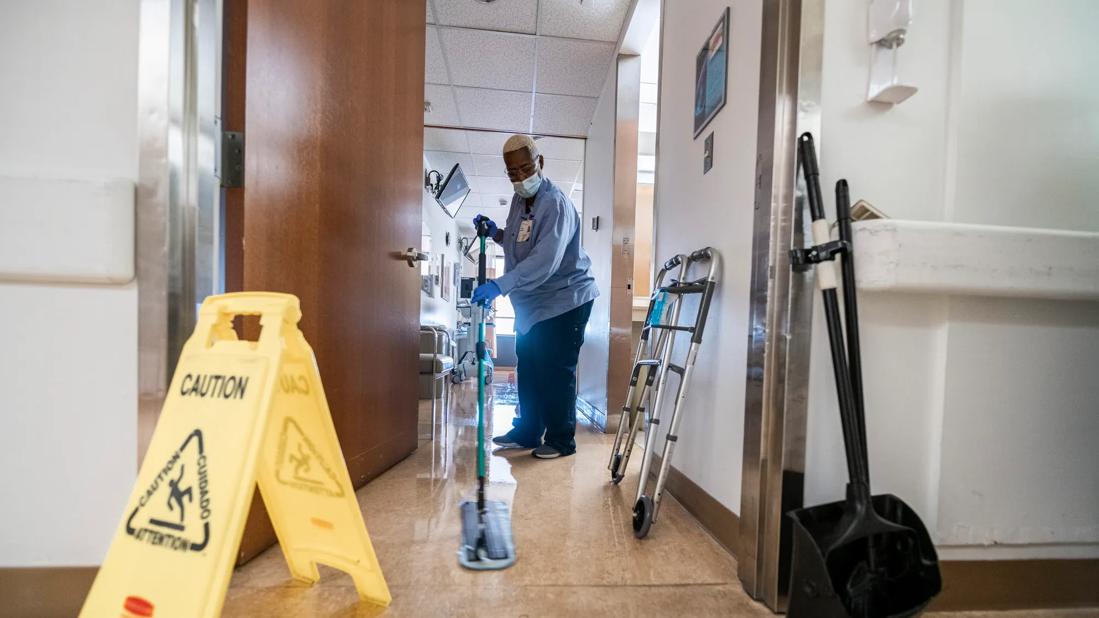Nursing Week offered an opportunity to thank therapists, specialists, EVS workers and others

Image content: This image is available to view online.
View image online (https://assets.clevelandclinic.org/transform/d028fe9e-877d-4369-a689-cc58a3404230/HRC_1959003_11-13-20_1535_MLC)
EVS worker
By Meredith Foxx, MSN, MBA, APRN, NEA-BC, Executive Chief Nursing Officer
Advertisement
Cleveland Clinic is a non-profit academic medical center. Advertising on our site helps support our mission. We do not endorse non-Cleveland Clinic products or services. Policy
Around the world, teamwork is recognized as essential to creating patient-centered healthcare. Effective teams improve clinical outcomes, enhance patient safety and ensure that good care is consistently provided to patients and families. And working on effective teams increases employee engagement, satisfaction and retention.
This photo essay demonstrates how nurses support each other and non-nursing caregivers as part of their jobs. This year, during Nurses Week, in addition to celebrating and honoring Cleveland Clinic’s nearly 35,000 nursing caregivers, nurses also expressed gratitude for fellow caregiving team members.
They shared examples of how the contributions of non-nursing caregivers complement nurses’ work and enable superior patient care. They highlighted how their non-nursing counterparts support Cleveland Clinic’s mission, vision, values and care priorities. And they showcased the value of having a team of teams to achieve goals.
The team of teams concept is about sharing talents and knowledge, and Cleveland Clinic nurses say that no one does this better than respiratory therapists. Respiratory teams guide nurses on the use of ventilators and breathing treatments so patients’ lungs can heal. They show nurses how to safely bath, turn, dress and transfer patients in delicate conditions.
They are also trusted and reliable care partners who collaborate with nurses to make informed patient care decisions. And when a nurse steps away from one patient to care for another, respiratory team members can be counted on to lend a hand by offering to get a patient water or by talking with patients and their families.
Advertisement
Every day, nurses work side by side with occupational, physical and speech therapy teams. Cleveland Clinic nurses are grateful for these partnerships for many reasons.
They appreciate that their therapist colleagues are open and honest regarding patient observations and concerns. Therapists share their expertise, such as recommendations on a patient’s mobility or swallowing capabilities, to ensure a more comprehensive plan of care. They allow their schedules to be flexible, depending on what is best for the patient.
There is also a mutual respect for each other’s roles. They participate in plan-of-care visits together, and their collective input ensures superior patient discharge planning. Therapists are also advocates for patient safety. They offer diligent assessments and speak up if a patient needs an alternate assistance or safety device, such as a chair alarm or gait belt.
Infection prevention specialists work hard to ensure that nursing caregivers have the resources, equipment and information necessary to provide patients the safest care, minimizing risk of cross-infection. For nurses, they are the source of truth in the pursuit of safety.
Infection prevention specialists round with nurses, they listen to nurses’ input and feedback, they educate and coach nursing teams, and they ensure compliance with policies and practices. Cleveland Clinic nurses view them as invaluable partners. They get nurses what they need to provide safe patient care and maintain their own personal well-being. In a constantly changing environment, infection prevention specialists support nurses in all the necessary ways.
Advertisement
Nurses also expressed thanks and appreciation for their colleagues in environmental services, transport, laboratory services, pharmacy, radiology, surgery, dietary/nutrition services and many others who support them every day. In healthcare, there’s certainly something to be said about the power of teamwork and the collective skills, passion and strength required from all to ensure high-performing teams and superior care delivery.
Advertisement
Advertisement
Advanced software streamlines charting, supports deeper patient connections
How holding simulations in clinical settings can improve workflow and identify latent operational threats
Interactive Zen Quest experience helps promote relaxing behaviors
Cleveland Clinic and IBM leaders share insights, concerns, optimism about impacts
Cleveland Clinic partners with Palantir to create logistical command center
A Q&A with organizational development researcher Gina Thoebes
Cleveland Clinic transformation leader led development of benchmarking tool with NAHQ
Raed Dweik, MD, on change management and the importance of communication